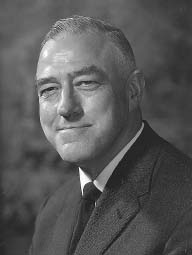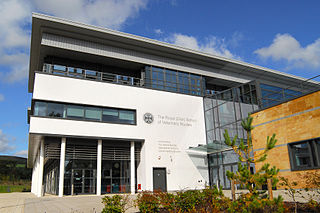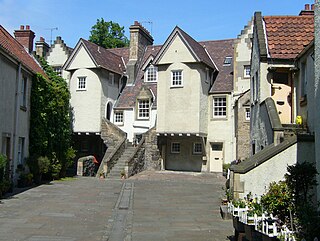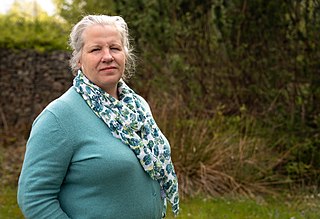Related Research Articles

Sir Michael Francis Addison Woodruff, was an English surgeon and scientist principally remembered for his research into organ transplantation. Though born in London, Woodruff spent his youth in Australia, where he earned degrees in electrical engineering and medicine. Having completed his studies shortly after the outbreak of World War II, he joined the Australian Army Medical Corps, but was soon captured by Japanese forces and imprisoned in the Changi Prison Camp. While there, he devised an ingenious method of extracting nutrients from agricultural wastes to prevent malnutrition among his fellow POWs.

The Royal (Dick) School of Veterinary Studies, commonly referred to as the Dick Vet, is the University of Edinburgh's vet school. It is part of the College of Medicine and Veterinary Medicine.

The School of Veterinary Medicine at the University of Glasgow is one of nine veterinary schools in the United Kingdom, and offers undergraduate and postgraduate qualifications in Veterinary Medicine.
Sir William Lee Weipers, FRCVS FRSE (1904–1990) was a Scottish veterinary surgeon and educator. Glasgow University's Weiper Memorial Lecture is named in his honour as is the Weipers Centre for Equine Welfare. He was President of the Royal College of Veterinary Surgeons for the period 1963/64.

William WilliamsFRSE PRCVS (1832–1900) was a Welsh veterinary surgeon who served as principal of the Dick Veterinary College in Edinburgh (1867–73) and as president of the Royal College of Veterinary Surgeons (1879). He was the founder and principal of the rival New Veterinary College (1873–1904), originally housed in Gayfield House, Edinburgh.

Sir John McFadyean FRSE LLD was a Scottish veterinary surgeon and Professor of Veterinary Science. He was Principal of the Royal Veterinary College from 1894 to 1927.

William Dick was a Scottish veterinarian and founder of the Dick Vet School in Edinburgh, the first veterinary college in Scotland. He is responsible for major advances in the field of veterinary science and the profession as a whole.
Orlando Charnock Bradley FRSE was a British veterinarian and first President of the National Veterinary Medical Association. He is described as one of the foremost veterinarians of the 20th century.
Joseph Henry Carter (1857–1930) was a leading British veterinarian, serving as President of the Royal College of Veterinary Surgeons in 1913/14 and 1920.
John Archibald Watt Dollar FRSE was a British veterinary surgeon. He served as President of the Royal College of Veterinary Surgeons 1904–05. He was an important and influential author of many veterinary textbooks.
Prof Henry Dryerre FRSE MRCS LRCP was a Scottish veterinarian and animal physiologist. He was Emeritus Professor of Physiology at the Dick Veterinary College in Edinburgh. The Carnegie Trust for the Universities of Scotland administer a bursary known as the Henry Dryerre Scholarship which is named in his honour. Due to his lineage he is sometimes referred to as Henry Dryerre IV.
Prof Alexander Edington MD CM FRSE (1860-1928) was a Scots-born bacteriologist and medical author strongly associated with South Africa. He made an important study of the Spanish flu pandemic of 1918.

John McDougal Russell Greig CBE FRSE MRCVS was a Scottish veterinarian who was Director of the Moredun Research Institute from 1930 to 1954. He is noted for the development of several important animal vaccines: Enzootic abortion in ewes; Braxy and Louping ill. His work on milk effectively created "clean milk" for the first time in Britain.
Allen Dalzell MD FRSE (1821–1869) was a Scottish chemist and pharmacologist who was professor of chemistry and materia medica at the Dick Veterinary College in Edinburgh.
Sir Frederick Thomas George Hobday CMG FRSE was an innovative veterinary surgeon who served as President of the Royal Veterinary College 1927 to 1937. The college holds an annual lecture entitled the Frederick Hobday Memorial Address. He was the official veterinary surgeon to Queen Alexandra from 1912 to 1939.
William Christopher Miller FRSE was a 20th century British veterinary surgeon and author. He was President of the National Veterinary Association in 1940.
Sir John Neish Ritchie FRSE FZS PRCVS CB LLD was a 20th-century Scottish veterinarian who rose to the top of his profession.
Sir Alexander Robertson was a Scottish veterinarian and administrator.
Frank Alexander FRSE MRCVS was an English veterinarian who served as Dean of the Dick Vet School, Edinburgh from 1970 to 1974.

Sheila Voas is a veterinary surgeon and the Chief Veterinary Officer of Scotland since 2012.
References
- ↑ Winton, Graham. Theirs Not to Reason Why: The Horsing of the British Army 1875-1925.
- ↑ Matthews, Peter K.; Macdonald, Alastair A; Warwick, Colin M. "The Royal (Dick) Veterinary College contingent of the Officers Training Corps" (PDF). Veterinary History. 8 (1): 5–27. S2CID 78012248. Archived from the original (PDF) on 5 October 2017.
- ↑ London Gazette 27 July 1928
- ↑ Biographical Index of Former Fellows of the Royal Society of Edinburgh 1783–2002 (PDF). The Royal Society of Edinburgh. July 2006. ISBN 0-902-198-84-X. Archived from the original (PDF) on 4 March 2016. Retrieved 5 October 2017.
- ↑ "William McGregor Mitchell (1888–1970)". Art UK. Retrieved 13 May 2018.